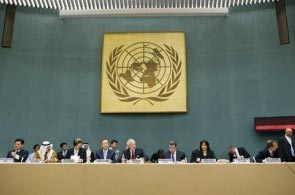Nepal stresses on education to bring change in LDCs

Nepal stressed on the quality of and access to education to prepare the future generations in the Least Developed Countries (LDCs) to face with the environmental, social and economic challenges in the substantive session of the UN Economic and Social Council (ECOSOC), and urged the development partners to invest in the education sector and provide sustainable support.
Taking part in the general debate of the high level segment of the substantive session on Thursday, the Permanent Representative of Nepal to the United Nations Gyan Chandra Acharya stated that despite significant progress made towards universal primary education and in achieving universal primary education and gender equality in education in developing and least developed countries, the challenges are many and are daunting. The session kicked off in Geneva of Switzerland on July 4 and will conclude on July 8.
Nepal is the chair of the Global Coordination Bureau of LDCs.
In his statement, Ambassador Acharya highlighted that the underlying factors for poor progress in education mainly include high drop-out rates and grade repetition, poor quality of education, teacher shortages, lack of adequate teacher development and deployment, inadequate infrastructure and supplies, and difficulties to reach the most vulnerable children and youth, often living in rural and remote areas.
He said that the LDCs, being the most vulnerable and weakest segment of international community, continue to grapple with enormous economic, human and social development challenges due to their structural constraints and unique difficulties.
“We are all aware that development is first and foremost the responsibility of the states themselves. Therefore, domestic resource-mobilisation is essential to ensure sustained spending in education for the long run, many countries, in particular the LDCs will not be able to meet the education-related MDGs and EFA goals without increased assistance by development partners up to the medium term,” he said, noting that though overall development assistance to basic education has almost doubled since 2002, aid for basic education has stagnated since 2007.
This year’s substantive session of ECOSOC is focused on a broad range of issues relevant to the implementation of the UN development agenda including the internationally agreed goals and commitments apropos to the education.
source:THT Online
Posted on: 2011-07-08































